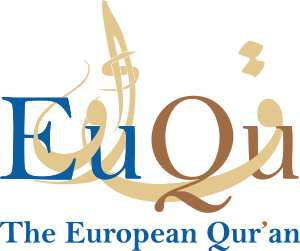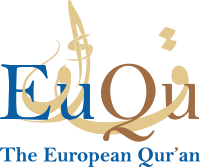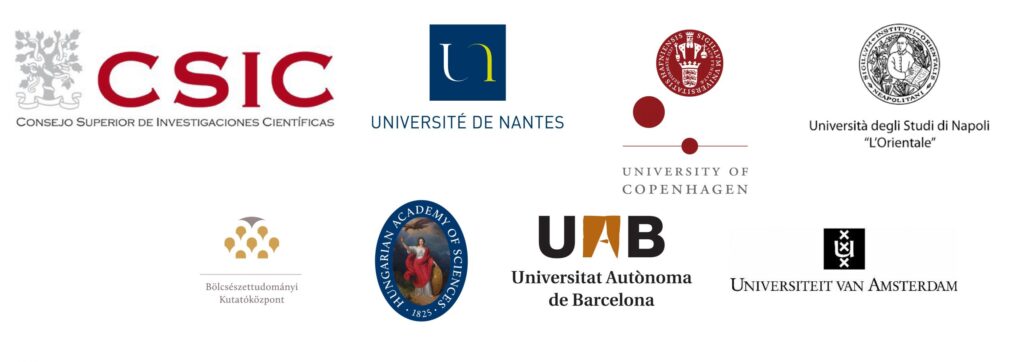De Gruyter Series
.
1. The Latin Qur’an, 1143-1500: Translation, Transition, Interpretation
Ferrero Hernández, Cándida, and John V. Tolan (eds). The Latin Qur’an, 1143-1500: Translation, Transition, Interpretation. EuQu 1. Berlin: De Gruyter, 2021.
– Biosca, Antoni. ‘Interpretatio Iuxta Traditionem: The Transmission of Latin Anti-Islamic Texts’ pp. 177–83. http://rua.ua.es/dspace/handle/10045/129509
– Burman, Thomas E. ‘The Four Oldest Latin Quotations of the Qur’an: Eighth/Ninth-Century al-Andalus’. pp. 11–25. http://hdl.handle.net/10261/308770
– Casassas Canals, Xavier. ‘The Bellús Qur’an, Martín García, and Martí de Figuerola: The Study of the Qur’an and Its Use in the Sermones de La Fe and the Disputes with Muslims in the Crown of Aragon in the Sixteenth Century’. pp 456–73. https://ddd.uab.cat/record/273999
– Cecini, Ulisse. ‘Qur’an Quotations in the Liber de Doctrina Mahumet’. pp. 317–48. https://ddd.uab.cat/record/268503
– De la Cruz Palma, Óscar. ‘Robert de Ketton, Traditore: Manifestations of Anti-Islamic Radicalism in the First Latin Translation of the Qur’an’. pp. 111–21. https://ddd.uab.cat/record/269089
– Ferrero Hernández, Cándida. ‘Introduction’. pp. 1–10. https://ddd.uab.cat/record/268505
– Ferrero Hernández, Cándida. ‘Riccoldo the Florentine’s Reprobación del Alcorán: A Manual for Preaching to the “Moors”’. pp. 111–21. https://ddd.uab.cat/record/268504
– Glei, Reinhold F. ‘Dixit Apostoli. The Word-by-Word Principle in Latin Translations of the Qur’an’. pp. 57–69. http://hdl.handle.net/10261/308771
– González Muñoz, Fernando. ‘Corrections to Robert of Ketton’s Translation of the Qur’an in MS Paris Bibliothèque de l’Arsenal 1162’. pp. 95–110. https://ruc.udc.es/dspace/handle/2183/32084
– Hanne, Olivier. ‘Translating from Arabic to Latin in the Twelfth Century: The Examples of Two Englishmen, Robert of Ketton and Adelard of Bath’. pp. 71–94. https://hal.science/hal-03902307
– Justicia Lara, Agustín. ‘Context and the Use of Quotes from Robert of Ketton’s Translation of the Qur’an in the Itinerarium Symonis Semeonis’. pp. 159–75. https://ddd.uab.cat/record/268508
– Khaly Wélé, Mouhamadoul. ‘Using Muslim Exegesis in Europe in the 12th and 18th Centuries: A Comparative Study of Robert of Ketton’s and George Sale’s Approaches’. pp. 349–61. https://shs.hal.science/halshs-03680907
– Langeloh, Jacob. ‘Qur’an at the Council. Manuscripts and Use of the Ketton Translation of the Qur’an at the Council of Basel (1431–1449)’. pp. 185–204. https://freidok.uni-freiburg.de/data/234191
– Lappin, Anthony. ‘On the Genesis and Formation of the Corpus Cluniacense’. pp. 27–56. http://su.diva-portal.org/smash/record.jsf?pid=diva2%3A1615443&dswid=-2629
– Martínez Gázquez, José. ‘The Extracta Ex Alcorano and Giacomo Della Marca’s Glosses in MS Falconara 3’. pp. 225–81. https://ddd.uab.cat/record/268506
– Ninitte, Florence. ‘The Contribution of the Speculum Historiale to the History of the Latin Risālat al-Kindī and the Corpus Cluniacense’. pp. 139–59. https://hal.science/hal-03955025v1
– Petrus Pons, Nadia. ‘The Glosses to the Marcos de Toledo’s Alchoranus Latinus’. pp. 123–38. https://ddd.uab.cat/record/274000
– Reginato, Irene. ‘An Indirect Usage of the Qur’an in the XVth Century. Jean Germain’s Débat du Chrétien et du Sarrasin’. pp. 205–24. https://nantes-universite.hal.science/hal-03954620
– Rivera Luque, J.L. Alexis. ‘Translatological Remarks on Rendering the Qur’an into Latin: (Robert of Ketton, Mark of Toledo and Egidio da Viterbo): Purposes, Theory, and Techniques’. pp. 123–38. https://refubium.fu-berlin.de/handle/fub188/38910
– Scotto, Davide. ‘Riccoldo da Monte di Croce and the Origins of the Qur’an as a Deviation from Christian Salvation History’. pp. 363–93. http://hdl.handle.net/10261/283441
– Starczewska, Katarzyna K. ‘Dhul-Qarnayn, The One of the Two Horns, in the Latin Glosses to the Qur’an’. pp. 299–315. http://hdl.handle.net/10261/283327
– Arias Torres, Juan Pablo. ‘Sicut Euangelia Sunt Quatuor, Distribuerunt Continentiam Eius in Quatuor Libros: On the Division of Iberian Qur’ans and Their Translations into Four Parts’. pp. 425–53. https://riuma.uma.es/xmlui/handle/10630/25456
– Tolan, John V. ‘Conclusion: Robert of Ketton’s Translation and Its Legacy’. pp. 475–80. https://shs.hal.science/halshs-03897672
.
2. The Qur’an, A Guidebook
– Tottoli, Roberto. The Qur’an: A Guidebook. EuQu 2. Berlin: De Gruyter, 2023. https://unora.unior.it/handle/11574/212779
.
3. The Iberian Qur’an: From the Middle Ages to Modern Times
García-Arenal, Mercedes and Gerard Wiegers (eds). The Iberian Qur’an: From the Middle Ages to Modern Times. EuQu 3. Berlin: De Gruyter, 2022. http://hdl.handle.net/10261/307511
– García-Arenal, Mercedes, and Gerard A. Wiegers. ‘The Iberian Qur’an and the Qur’an in Iberia: A Survey’. pp. 1–24. http://hdl.handle.net/10261/303369
– Burnett, Charles. ‘Robert of Ketton and Mark of Toledo and the Rise and Development of the Literal Translation of the Qur’an’. pp. 25–48.
– Witcombe, Teresa. ‘The Qur’an and the “Laws of Muḥammad” in Medieval Christian Eyes’. pp. 49–68.
– Lappin, Anthony John. ‘A Mozarabic Qur’an? Some Reflexions on the Evidence’. pp. 69–106. https://www.diva-portal.org/smash/record.jsf?pid=diva2%3A1714706&dswid=-5122
– Scotto, Davide. ‘Projecting the Qur’an into the Past. A Reassessment of Juan de Segovia’s Disputes with Muslims in Medina Del Campo (1431)’. pp. 107–32. http://hdl.handle.net/10261/308798
– Cecini, Ulisse. ‘Germanus de Silesia’s Qur’an Translation in the MS K-III-1 of the El Escorial Library: Newly Discovered Revised Versions’. pp. 133–48. https://ddd.uab.cat/record/285201
– Wiegers, Gerard A. ‘The Office of the Four Chief Judges of Mamluk Cairo and Their Views on Translating the Qur’an in the Early Sixteenth Century: Iberian Islam in a Global Context’. pp. 151–63. https://hdl.handle.net/11245.1/de59e62d-adb4-4b27-a98a-4bb34b8a28bd
– Rodríguez Iglesias, Adrián. ‘New Models of Qur’an Abridgment among the Mudejars and Moriscos: Copies in Arabic Containing Three Selections of Suras’. pp. 165–98. http://hdl.handle.net/10261/308803
– Roza Candás, Pablo. ‘Dialectal Variations in Aljamiado Translations of the Qur’an’. pp. 199–215. http://hdl.handle.net/10261/308812
– Rodríguez Iglesias, Adrián, and Pablo Roza Candás. ‘Morisco Methods for Memorizing the Qur’an: Fragmentary Copies with the Suras in Reverse Order’. pp. 217–44. http://hdl.handle.net/10261/308814
– García-Arenal, Mercedes. ‘The Inquisition and the Search for Qur’ans’. pp. 245–82. http://hdl.handle.net/10261/303370
– Szpiech, Ryan. ‘Sounding the Qur’an: The Rhetoric of Transliteration in the Antialcoranes’. pp. 285–318. https://sites.lsa.umich.edu/ryanszpiech/wp-content/uploads/sites/88/2023/01/2022.Szpiech.Sounding.Quran_.Iberian.Quran_.finalprint.pdf
– Bernabé Pons, Luis F. ‘Preaching, Polemic, and Qur’an. Joan Martí de Figuerola’s Lumbre de Fe contra el Alcorán’. pp. 319–42. https://rua.ua.es/dspace/bitstream/10045/138423/1/Bernabe-Pons_The-Iberian-Qur-an.pdf
– Tottoli, Roberto. ‘Quoting the Original: Figuerola’s Lumbre de Fe and the Arabic Qurʾan’. pp. 343–97.
– Starczewska, Katarzyna K. ‘Translations from Arabic of Iberian Origin in Egidio Da Viterbo’s Qur’an’. pp. 399–420. http://hdl.handle.net/10261/308819
– Sellim, Maxime. ‘To Translate Is to Interpret, Exegetic Annotations in the Qur’an of Bellús (Valencia c. 1518)’. pp. 421–40. https://shs.hal.science/halshs-04355947
– Arias Torres, Juan Pablo. ‘Rediscovering the Qur’an in Nineteenth-Century Spain: Allure and Aversion in the Shadow of A. B. Kazimirski’s French Edition’. pp. 443–67. http://hdl.handle.net/10261/341000
– Boyano Guerra, Isabel, and Fernando Rodríguez Mediano. ‘José Filiberto Portillo: Qur’an, Poetry and Exile in the Court of Isabel II’. pp. 469–98. http://hdl.handle.net/10261/303363
– Donoso, Isaac. ‘The Qur’an in the Spanish Philippines’. pp. 499–532. https://rua.ua.es/dspace/bitstream/10045/139165/1/Quran-in-the-Spanish-Philippines_Donoso.pdf
.
4. The Qur’an in Rome: Manuscripts, Translations, and the Study of Islam in Early Modern Catholicism
Stella, Federico and Roberto Tottoli (eds.). The Qur’an in Rome: Manuscripts, Translations, and the Study of Islam in Early Modern Catholicism. EuQu4. Berlin: De Gruyter, 2024.
– Arias Torres, Juan Pablo. ‘A Qur’anic Compendium in Spanish for Use by the Inquisition (BNE MS 2076)’. pp. 125–46. http://hdl.handle.net/10261/350194
– Canton, Anna. ‘A Harmony of Intent: Bishop Gregorio Barbarigo (1625–1697) and Ludovico Marracci (1612–1700)’. pp. 403–12.
– Cecini, Ulisse. ‘Dominicus Germanus de Silesia in Rome: The Roman Prodromes of a Future Qur’an Translator’. pp. 263–86. https://ddd.uab.cat/record/311442
– Fani, Sara. ‘Printing the Qur’an in Rome: From the Typographia Medicea to Marracci’s Paduan Edition’. pp. 79–122. https://cris.unibo.it/handle/11585/963677
– Loop, Jan, and Federico Stella. ‘Across Confessional Boundaries. Bibliander’s Alcoran-Edition in Catholic Europe’. pp. 179–202. https://unora.unior.it/handle/11574/231281
– Martini, Giovanni Maria. ‘The Islamicate Occult Library of Athanasius Kircher’. pp. 305–46. https://unora.unior.it/handle/11574/228921
– McInally, Tom. ‘George Strachan of the Mearns’. pp. 147–56.
– Pintimalli, Andrea. ‘From Dīn, Milla, Umma to Religio, Secta, Superstitio: Marracci’s Latin-Arabic for “Religion” – A Lexical Analysis within the Historical Framework of the European History of the Modern Concept of Religion’. pp. 433–46.
– Prado Garcia, Javier De. ‘From Rome to the East: An Analysis of the Main “Roman” Anti-Islamic Sources of the De Procuranda Salute Omnium Gentium (1613)’. pp. 237–62.
– Petrolini, Chiara. ‘Rome as a Hub of Arabic Studies in the 17th Century: A View from Vienna’. pp. 157–78.
– Petrone, Michele. ‘Marsili, the Inquisition and Oriental Studies in Bologna’. pp. 203–34.
– Salierno, Loriana. ‘The Role of Greek and Latin Auctores in Ludovico Marracci’s Alcorani Textus Universus’. pp. 413–32.
– Scotto, Davide. ‘Traces of the Qur’an in the Books of Cardinal Domenico Capranica. An Investigation of BAV MS Vat. Lat. 7317’. pp. 29–54.
– Shore, Paul. ‘A Solitary Jesuit Scholar and the Qur’an: The Translation and Commentary of Ignazio Lomellini’. pp. 289–304.
– Stella, Federico. ‘Introduction’. pp. 1–26.
– Stella, Federico. ‘The Qur’an and the Arabic Language in the Writings of Baldassarre Loyola Mandes S.J. (1631–1667). Between Islamic Reminiscence and Catholic Controversy’. pp. 347–70. https://unora.unior.it/handle/11574/231280
– Tottoli, Roberto. ‘The Qur’an of Guglielmo Raimondo Moncada: The Arabic Versions of Suras 21 and 22 in BAV MS Urb. Lat. 1384’. pp. 55–78. https://unora.unior.it/handle/11574/228301
– Vázquez Ruiz, David. ‘Praxis Conuertendi Mahumetanos. Tirso González de Santalla’s Manuductio’. pp. 371–400.
.
5. European Muslims and the Qur’an: Practices of Translation, Interpretation, and Commodification
Sibgatullina, Gulnaz and Wiegers, Gerard (eds.). European Muslims and the Qur’an: Practices of Translation, Interpretation, and Commodification. EuQu 5. Berlin: De Gruyter, 2024.
– Bustanov, Alfrid. “On Qur’anic Culture in Inner Russia between the Seventeenth and Twentieth Centuries”, pp. 165–186. https://hdl.handle.net/11245.1/9cf22df0-c9a8-4941-8fb9-d7c4143b8884
– Karić, Enes. ‘The Qurʼan in the Manuscript Tradition of Bosnia and Herzegovina”, pp. 101–116.
– Kulwicka-Kamińska, Joanna, and Czesław Łapicz. ‘An Interplay Between Muslim and Christian Cultures: Polish Qur’an Translations Between the Sixteenth and Nineteenth Centuries”, pp. 77–98.
– Pink, Johanna. “The Inimitable Qur’an and the Languages of Empire: Muslim Qur’an Translation in the Languages of Western Europe in the Early Twentieth Century”, pp. 219–256. https://freidok.uni-freiburg.de/data/259320
– Rodríguez Iglesias, Adrián, and Maxime Sellin. “Links Between Morisco and Early Modern European Interpretations: The Case of “Ālif LāmMīm” (Q 2:1)”. pp. 55–76. https://hdl.handle.net/11245.1/b2ddbe66-232b-4893-af3a-0451879da421
– Shikhaliev, Shamil, and Ilona Chmilevskaia. “The Qur’ans of Dagestan: Practices of Copying, Using, and Translating”. pp. 117–142. https://hdl.handle.net/11245.1/36e2d540-c7c0-4e02-b516-77445032f7f5
– Sibgatullina, Gulnaz. “On Translating the Qur’an into Turkic Vernaculars: Texts, Ties, and Traditions”.pp. 189–218. https://hdl.handle.net/11245.1/81e39701-d185-4f51-bd6a-ee855e92178c
– Sibgatullina, Gulnaz. “The European Qur’an: Towards an Inclusive Definition”, pp. 1–20. https://hdl.handle.net/11245.1/eee3d37f-f0e4-4d35-9b2e-9af9ccb901c2
– Wiegers, Gerard. “Muslims in Christian Iberia and Translations of the Qur’an in Europe: From Subordinate Informants to Participants in the Republic of Letters”, pp. 23–54. https://hdl.handle.net/11245.1/0630e0b1-1281-4a50-8806-79a0d8b1e10a
– Yakubovych, Mykhaylo. “Commenting, Publishing, and Translating: Evolution of Qur’anic Traditions in Crimea from the Eighteenth to the Twentieth Century”, pp. 143–164. De Gruyter, 2023. https://freidok.uni-freiburg.de/data/259315
.
6. Eastern Christians’ Engagement with Islam and the Qur’an: Text, Context and Knowledge Regimes
Negoiță, Octavian-Adrian (ed.). Eastern Christians’ Engagement with Islam and the Qur’an: Text, Context and Knowledge Regimes. Berlin: De Gruyter, 2025.
– Octavian-Adrian Negoiță, “Prolegomena to Eastern Christians’ Engagement with Islam and the Qur’ān”, p. 1
– Bert Jacobs, “An Early Syriac Response to the Charge of Taḥrīf in George of Bʿeltan’s Commentary on the Gospel of Matthew”, p. 7
– Barbara Roggema, “Qur’ānic Letter versus Spirit: Approaches to the Qur’ān in Kitāb Usṭāt al-rāhib and Masāʾil wa-ajwiba ʿaqliyya wa-ilāhiyya”, p. 45
– Thomas A. Carlson, “Becoming All Things to All People: Positive Readings of Qur’ānic Christianity in Arabic Christian Apologetics”, p. 77
– Manolis Ulbricht, “Continuities and Discontinuities in Byzantine Anti-Islamic Polemics from the Seventh to the Thirteenth Century: The Mount Athos, Great Lavra, MS gr. Ω 44”, p. 101
– Zofia A. Brzozowska and Mirosław J. Leszka, “Michael Synkellos and His Lost Refutation of Islam in the Medieval Byzantine-Slavic Literary Tradition”, p. 125
– Alessandro Gori, “The Qur’ān in Ethiopia and Eritrea, Ethiopia and Eritrea in the Qur’ān: Textual Connections and Circulation among Muslims and Christians of al-Ḥabasha”, p, 153
– Anna Ohanjanyan, “The Armenian Confutatio Alcorani and Its Polemical Function for the Armenian Communities in Pre-Modern Iran”, p. 173
– Octavian-Adrian Negoiță, “Anti-Islamic Polemics, Scholarship and Encyclopedism in the Greek Orthodox World: Nicholas Karatzas and His Summa Saracenica”, p, 201
– Nadezhda Alexandrova, “System and Muhammadan Religion by Sofroniy Vrachanski: The Bulgarian Translation of Dimitrie Cantemir’s Kniga Sistima”, p. 251
– Stefan Schreiner, “Russian Orthodox Qur’ān Translations of the Eighteenth- and Nineteenth Century and Tatar-Muslim Responses”, p. 277
– Jan Loop, “Epilogue: Christian Reading of the Qur’ān in the Islamic World”
.
7. The Lost Libraries of Tunis: Book Culture of Ḥafṣid Ifrīqiya and Arabic Manuscripts in Europe after the Sack of Tunis (1535)
Hinrichsen, Laura. The Lost Libraries of Tunis: Book Culture of Ḥafṣid Ifrīqiya and Arabic Manuscripts in Europe after the Sack of Tunis (1535). EuQu 7. Berlin: De Gruyter, 2024. https://doi.org/10.1515/9783111343631
.
9. Juan de Segovia and the Qur’an: Converting the Muslims in Fifteenth-Century Europe
Scotto, Davide. Juan de Segovia and the Qur’an: Converting the Muslims in Fifteenth-Century Europe. EuQu 9. Berlin: De Gruyter, 2024.
.
10. Christians and Tafsīr. Interreligious Readings of Muslim Exegetical Sources from the Middle Ages to Early-Modern Times
Ulisse Cecini (ed.). Christians and Tafsīr. Interreligious Readings of Muslim Exegetical Sources from the Middle Ages to Early-Modern Times. EuQu 10. Berlin: De Gruyter, 2025. https://doi.org/10.1515/9783111444352
Ulisse Cecini, “Introduction” https://doi.org/10.1515/9783111444352-001
David Bertaina, “Qur’an Commentaries in Medieval Christian Arabic Texts” https://doi.org/10.1515/9783111444352-002
J. L.Alexis Rivera Luque, “Towards the Identification of the Exegetical Material Used by Robert of Ketton in His Latin Translation of the Qur’an (536–37/1142–43)” https://doi.org/10.1515/9783111444352-003
Thomas E. Burman, “Ramon Martí and Tafsīr” https://doi.org/10.1515/9783111444352-004
Benoît Grévin and Katarzyna K. Starczewska, “Reading Qur’an and Tafsīr from a Hebrew Perspective? Remarks on Flavius Mithridates’ Translations and Commentaries in Manuscripts Urb. Lat. 1384 and Vat. Ebr. 357” https://doi.org/10.1515/9783111444352-005
Benoît Grévin, “Latin Translation of Muslim Exegesis in the Margins of the “Qur’an of Flavius Mithridates” (Manuscript Vat. Ebr. 357, fol. 51r–156r). Content, Preliminary Analysis and Questions” https://doi.org/10.1515/9783111444352-006
Gerard Wiegers, “Ludovico Marracci’s Use of Tafsīr and His Interpretation of Jesus’ Demise in the Sacromonte Lead Books” https://doi.org/10.1515/9783111444352-007
Loriana Salierno, “Between Exegesis and Linguistics: Ludovico Marracci’s Latin Translation of the Qur’an” https://doi.org/10.1515/9783111444352-008
Ulisse Cecini, “An Analysis of Dominicus Germanus de Silesia’s Incorporation of Tafsīr in His Interpretatio Alcorani Litteralis (ca. 1652–70)” https://doi.org/10.1515/9783111444352-009
Irene Vicente López de Arenosa, “Fábulas de Mahoma: a Late Antialcorán Literature Work by the Franciscan Pedro de Alcántara, Marrakech (17th century)” https://doi.org/10.1515/9783111444352-010
Patricia Sánchez-García, “Shaping a Christian Arabic Vocabulary through European Orientalism in the 16th–17th Centuries” https://doi.org/10.1515/9783111444352-011
Paul Babinski, “The Orientalist Turn to Tafsīr: Abraham Wheelock’s Qur’an” https://doi.org/10.1515/9783111444352-012
Octavian-Adrian Negoiță, “In the Workshop of an Eastern Christian Orientalist: Dimitrie Cantemir (d. 1723) and the Islamic Sources of the System or Structure of the Muḥammadan Religion” https://doi.org/10.1515/9783111444352-013
11. Multilingual Islamic Manuscripts in Eastern and Western Europe. Languages, Scripts, and Messages
Katarzyna K. Starczewska (ed.). Multilingual Islamic Manuscripts in Eastern and Western Europe. Languages, Scripts, and Messages. EuQu 11. Berlin: De Gruyter, 2026.
Dévényi, Kinga. “‘Traces of Turkish Flowers’: Islamic Manuscripts in Buda and Pest from Ottoman Times until Today.” In Multilingual Islamic Manuscripts in Eastern and Western Europe, edited by Katarzyna Starczewska. De Gruyter, 2026. https://doi.org/10.1515/9783111679150-006
Drozd, Andrzej. “Manuscripts of the Polish-Lithuanian Tatars and Their Multilevel Multilingualism.” In Multilingual Islamic Manuscripts in Eastern and Western Europe, edited by Katarzyna Starczewska. De Gruyter, 2026. https://doi.org/10.1515/9783111679150-002
Grévin, Benoît. “Multilingualism and Multigraphism in a Judeo-Christian Context. Alphabets and Languages in the ‘Qur’an of Flavius Mithridates’ (MS Vat. Ebr. 357, Fols. 51r–156r).” In Multilingual Islamic Manuscripts in Eastern and Western Europe. De Gruyter, 2026. doi/10.1515/9783111679150-009
Kulwicka-Kamińska, Joanna. “The Critical Edition of the Slavic (Polish) Translation of the Qur’an, the Tefsir of the Tatars of the Former Grand Duchy of Lithuania from the Late 16th or Early 17th Cent.” In Multilingual Islamic Manuscripts in Eastern and Western Europe, edited by Katarzyna Starczewska. De Gruyter, 2026. https://doi.org/10.1515/9783111679150-005
Mišević, Marijana. “A Clue to Historical Language Ideology in the Ottoman Context: Al-Būṣīrī’s Qaṣīdatu l-Burda in South-Slavic/Bosnian.” In Multilingual Islamic Manuscripts in Eastern and Western Europe, edited by Katarzyna Starczewska. De Gruyter, 2026. https://doi.org/10.1515/9783111679150-007
Miškinienė, Galina. “The Catalogues of the Lithuanian Tatars’ Manuscripts: An Overview of Preserved Tefsirs.” In Multilingual Islamic Manuscripts in Eastern and Western Europe, edited by Katarzyna Starczewska. De Gruyter, 2026. https://doi.org/10.1515/9783111679150-003
Rivera Luque, J. L. Alexis. “Greek Literature in Arabic Script: Definition, Texts, and Characteristics.” In Multilingual Islamic Manuscripts in Eastern and Western Europe, edited by Katarzyna Starczewska. De Gruyter, 2026. https://doi.org/10.1515/9783111679150-008
Sellin, Maxime. “Widmanstetter’s Corpus of Arabic Annotated Codices.” In Multilingual Islamic Manuscripts in Eastern and Western Europe. EuQu11. De Gruyter, 2026. https://doi/10.1515/9783111679150-010
Starczewska, Katarzyna K. “Multilingual Islamic Manuscripts in Europe: Framing the Volume.” In Multilingual Islamic Manuscripts in Eastern and Western Europe, edited by Katarzyna Starczewska. EuQu11. De Gruyter, 2026. https://doi.org/10.1515/9783111679150-001
Synkova, Irina. “From Turkic to Slavic: Translations and Commentaries of the Qur’an in the Literature of the Lithuanian Tatars.” In Multilingual Islamic Manuscripts in Eastern and Western Europe, edited by Katarzyna Starczewska. De Gruyter, 2026. https://doi.org/10.1515/9783111679150-004
Woźniak, Maria. “The Life of Muhammad and Description of the Qur’an by Michel Baudier, a French Nobleman: Description of a Polemical Anti-Islamist Treatise from the Seventeenth Century.” In Multilingual Islamic Manuscripts in Eastern and Western Europe, edited by Katarzyna Starczewska. De Gruyter, 2026. https://doi.org/10.1515/9783111679150-011
REVIEWS
Reviews of the book The Latin Qur’an, 1143–1500
– Scott G. Bruce, Review of The Latin Qur’an, 1143-1500: Translation, Transition, Interpretation, ed. Cándida Derrero Hernández and John Tolan, The European Qur’an 1 (Berlin: De Gruyter, 2021). Mediaevistik 35 (2022): 553-555. https://www.ingentaconnect.com/content/plg/med/2022/00000035/00000001/art00148
– MR Fakhr-Rohani, Book Review: The Latin Qur’an, 1143-1500: Translation, Transition, Interpretation Al-Mustafa International University 2024 qns.journals.miu.ac.ir
– Magiran
– Noormags.ir
Review of the book The Iberian Qurʾan
– Alistair Hamilton, “Review of The Iberian Qur’an: From the Middle Ages to Modern Times.” Journal of the American Oriental Society 144, no. 4 (2024): 897-899. https://doi.org/10.7817/jaos.144.4.2024.r046
– Nuria de Castilla, Mercedes García-Arenal, Gerard A. Wiegers (éd.), The Iberian Qur’an. From the Middle Ages to Modern Times. Bulletin critique des Annales islamologiques 38 (2024)
Review of the book The Qurʾān a guidebook
– International Qur’anic Studies Association https://iqsaweb.org/2023/02/27/new-publication-the-quran-a-guidebook/
Reviews of the book The Qur’an in Rome
– Alastair Hamilton, “Review of The Qur’an in Rome.” Church history and religious culture 105, no. 1 (2025): 136-39. https://soeg.kb.dk/permalink/45KBDK_KGL/1f0go08/cdi_crossref_primary_10_1163_18712428_10501003
– Review of The Qur’an in Rome: Manuscripts, Translations, and the Study of Islam in Early Modern Catholicism. Nouvelle revue théologique 1, no. 147 (2025) https://www.nrt.be/fr/recensions/the-qur-an-in-rome-manuscripts-translations-and-the-study-of-islam-in-early-modern-catholicism-15138
Reviews of the book Juan de Segovia and the Qur’an
– Jesse-D. Mann Davide Scotto, Juan de Segovia and the Qur’an: Converting Muslims in Fifteenth-Century Europe. The European Qur’an, vol. 9, De Gruyter, Berlin 2024, 263 pp. Anuario de Historia de la Iglesia, 34 (2025) 630-631 https://doi.org/10.15581/007.34.051
– Octavian-Adrian Negoiță, Review of D. Scotto, Juan de Segovia e il Corano: Convertire i musulmani nell’Europa del Quatrocento. Loveno di Menaggio-Villa Vigoni, 2022″, in: Rivista Storica Italiana 137/1 (2025), 487-490
Review of The European Qurʾān: Encounters with the Holy Text
– Asmara Edo Kusuma, Review of “The European Qurʾān: Encounters with the Holy Text of Islam from the Ninth to the Twentieth Century, by Jan Loop and Naima Afif (eds.)”. Journal of Religion in Europe (2025). https://brill.com/view/journals/jre/aop/article-10.1163-18748929-bja10141/article-10.1163-18748929-bja10141.xml




